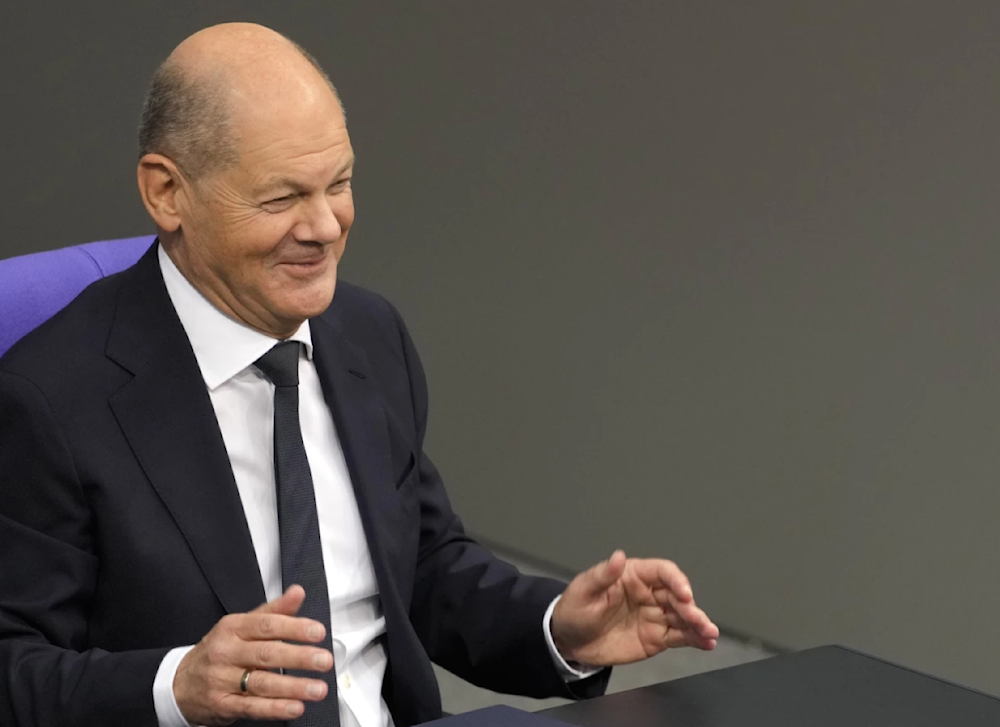Scholz to lead SPD into snap German election after Pistorius withdraws
Boris Pistorius reported his decision to withdraw was purely a personal one, despite reports surfacing of him being pressured by Olaf Scholz.
-

German Chancellor Olaf Scholz smiles during a plenary session in the German parliament in Berling on November 13, 2024. (AP)
Following German Defense Minister Boris Pistorius' withdrawal from the electoral race, German Chancellor Olaf Scholz will be nominated as the candidate to lead his Social Democratic Party (SPD) into the February general election.
After weeks of speculation about leadership changes, Pistorius announced on Thursday that he would not be available to lead the SPD in the upcoming snap election. This follows Chancellor Scholz's decision to dismiss Finance Minister Christian Lindner, which caused the collapse of the three-year-old coalition government.
"This is my sovereign, personal, and entirely own decision," Pistorius said in a three-minute video broadcast to the SPD's WhatsApp channel. “I did not launch this debate, I didn’t want it and I didn’t put myself forward for anything.”
Reportedly, pressure from Scholz and other top SPD members led to Pistorius announcing he would not run as the SPD candidate for chancellor, despite support from many MPs and former leaders. Scholz remains the default choice, but his standing has weakened, with some labeling him the weakest postwar candidate. Meanwhile, the CDU's Friedrich Merz is poised for success, as polling shows the SPD trailing with just 16% support compared to the CDU's 32%.
The Die Zeit weekly reported that "the wrong one stepped aside," adding that the SPD leadership chose the "safe choice" of staying with Scholz over the unusual action of withdrawing a serving chancellor from the vote against his wishes.
A good candidate?
Scholz's stance on weapons shipments to Ukraine, as opposed to Pistorius' more hawkish views, made the chancellor more appealing to the party's left-wing, although his critics claim he lacked the leadership to control his three-way coalition with the liberal Free Democratic Party (FDP) and the Greens, as well as the communication skills to sell its policy goals to voters grappling with high inflation and a bleak economy.
Scholz sacked Lindner after a months-long disagreement over how to plug a multibillion-euro deficit in the national budget, after the finance minister's insistence on strict adherence to the country's debt limit.
The coalition members had been at odds over economic policy for months, with Linder even accusing Scholz of orchestrating the collapse of the coalition, an allegation the chancellor vehemently rejected.
In an interview with Der Spiegel former Chancellor Angela Merkel remarked on Scholz's angry broadcast statement after firing Lindner and announcing he was pursuing fresh elections, calling it "not exactly an object lesson in dignity".
"You feel a lot of emotions, but it’s better if you shout at the wall in your office than at the German public,” Merkel noted.
Scholz's SPD demands apology from FDP over coalition collapse
Last week, Matthias Miersch, secretary general of Chancellor Olaf Scholz's Social Democratic Party (SPD), requested an apology from the Free Democratic Party (FDP) following media allegations that the party had been plotting to leave the government coalition since September.
According to sources cited by the German tabloid Zeit, the FDP has been preparing to depart from the government coalition since September and discussed the topic during a meeting at Truman-Villa in Potsdam.
Miersch told German television station NTV "I do not expect [leader of the Free Democratic Party] Christian Lindner to have the greatness to apologize to the people. But if someone in the FDP still has at least a drop of honor, then now is the time to do it with all humility."
The lawmaker described the occurrence as a political scam that harmed the entire country, saying that the move was not only foolish but also represented the decline of German political culture.
Scholz, who announced a confidence vote in January, with potential snap elections in March, will seek to reassure European allies at a summit in Budapest. He said late Wednesday that he plans to reach out to conservative opposition leader Friedrich Merz, who is currently leading in the polls, for support in passing key legislation on the economy and defense.
The collapse of his coalition, which robs him of a governing majority, comes at a critical moment for Germany's economy, projected to shrink for the second consecutive year.
Berenberg bank analyst Holger Schmieding wrote, "The early end of the coalition leaves Germany somewhat rudderless in what could be an exceptionally turbulent time right after Donald Trump won the U.S. election." However, Schmieding suggested that snap elections and fresh leadership in early 2025 could be beneficial, noting that "the constant bickering within the now-defunct three-party coalition had turned into a major obstacle to growth."

 5 Min Read
5 Min Read








